Chris Dannen - Building Games with Ethereum Smart Contracts: Intermediate Projects for Solidity Developers
Here you can read online Chris Dannen - Building Games with Ethereum Smart Contracts: Intermediate Projects for Solidity Developers full text of the book (entire story) in english for free. Download pdf and epub, get meaning, cover and reviews about this ebook. year: 2018, publisher: Apress, genre: Computer. Description of the work, (preface) as well as reviews are available. Best literature library LitArk.com created for fans of good reading and offers a wide selection of genres:
Romance novel
Science fiction
Adventure
Detective
Science
History
Home and family
Prose
Art
Politics
Computer
Non-fiction
Religion
Business
Children
Humor
Choose a favorite category and find really read worthwhile books. Enjoy immersion in the world of imagination, feel the emotions of the characters or learn something new for yourself, make an fascinating discovery.
- Book:Building Games with Ethereum Smart Contracts: Intermediate Projects for Solidity Developers
- Author:
- Publisher:Apress
- Genre:
- Year:2018
- Rating:4 / 5
- Favourites:Add to favourites
- Your mark:
Building Games with Ethereum Smart Contracts: Intermediate Projects for Solidity Developers: summary, description and annotation
We offer to read an annotation, description, summary or preface (depends on what the author of the book "Building Games with Ethereum Smart Contracts: Intermediate Projects for Solidity Developers" wrote himself). If you haven't found the necessary information about the book — write in the comments, we will try to find it.
Learn how to take your existing knowledge of Ethereum and Solidity to the next level. Hone your development skills and become more familiar with the syntax of the Solidity language by working through well-tested, well-documented intermediate-level sample projects.
You will begin by covering the basics of Ethereum, Solidity, and gaming theory. From there, you will move onto sample projects that use smart contract engineering to create fun casino-style games that you can deploy and test on your friends and colleagues with real ether. All games are provably fair and auditable, so that players know the house wont always win!
Ideal for any reader with exposure to Ethereum, the techniques this book teaches are applicable to game developers, software engineers, web developers, and cryptocurrency enthusiasts.
What Youll Learn
- Use various features and best practices for smart contract programming in Ethereum and Solidity
- Develop and deploy games of chance, similar to the kind youd find in a casino
- Create fun, easy projects with Ethereum
- lntegrate the Ethereum blockchain into games
Who This Book Is For
Entry-level programmers with some exposure to Ethereum; game developers, Blockchain and cryptocurrency enthusiasts looking to add Ethereum and Solidity development to their skill set; software engineers and Web developers
Chris Dannen: author's other books
Who wrote Building Games with Ethereum Smart Contracts: Intermediate Projects for Solidity Developers? Find out the surname, the name of the author of the book and a list of all author's works by series.

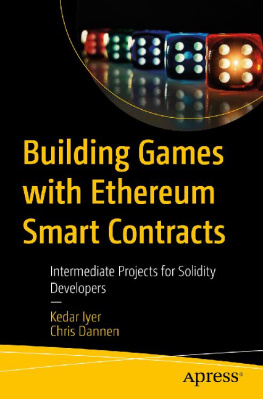

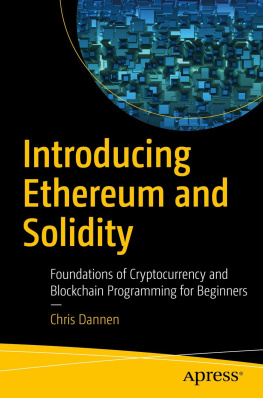



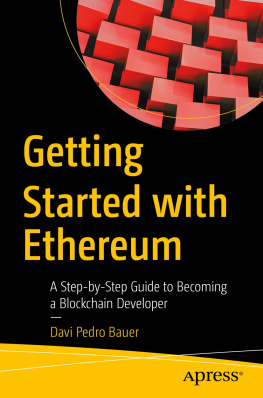
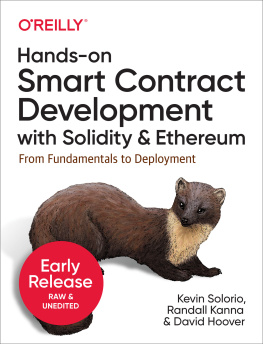
![Debajani Mohanty [Debajani Mohanty] - Ethereum for Architects and Developers: With Case Studies and Code Samples in Solidity](/uploads/posts/book/119695/thumbs/debajani-mohanty-debajani-mohanty-ethereum-for.jpg)
![Chris Dannen [Chris Dannen] - Introducing Ethereum and Solidity: Foundations of Cryptocurrency and Blockchain Programming for Beginners](/uploads/posts/book/119690/thumbs/chris-dannen-chris-dannen-introducing-ethereum.jpg)
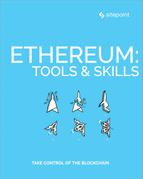
![Fatima Castiglione Maldonado [Fatima Castiglione Maldonado] - Introduction to Blockchain and Ethereum](/uploads/posts/book/119687/thumbs/fatima-castiglione-maldonado-fatima-castiglione.jpg)